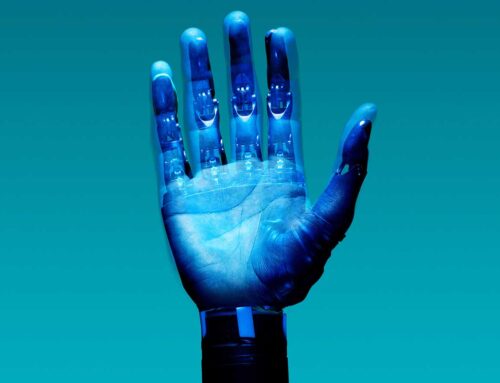 ……This Week in HealthCare
……This Week in HealthCare
By Fred Binczewski | MHA fredb@uprisecg.com | Click Here to download this article (pdf).
February 8, 2021
Artificial Intelligence Applications Impacting Healthcare
As our knowledge and playbook for the Covid -19 pandemic requires almost daily updates in uncertain times, it has been a natural extension to incorporate all tools known to the healthcare environment in an attempt to conquer a most formidable enemy in the virus. One of these unprecedented tools used has been Artificial Intelligence, (AI). Artificial Intelligence, according to the Oxford Dictionary is described as, “the theory and development of computer systems able to perform tasks that normally require human intelligence, such as visual perception, speech recognition, decision-making, and translation between languages”.1 Additionally, Britannica defines AI as, “the ability of a computer or a robot controlled by a computer to do tasks that are usually done by humans because they require human intelligence and discernment”.2 Finally, artificial intelligence has been separated and defined into 4 distinct categories as follows:
- Reactive Machines– perform basic operations; this level of A.I. is the simplest. These types react to some input with some output. There is no learning that occurs. This is the first stage to any A.I. system. The model stores no inputs, it performs no learning.
- Limited Memory– limited memory types refer to an A.I.’s ability to store previous data and/or predictions, using that data to make better predictions. With Limited Memory, machine learning architecture becomes a little more complex. Every machine learning model requires limited memory to be created, but the model can get deployed as a reactive machine type.
- Theory of Mind– we have yet to reach Theory of Mind artificial intelligence types. These are only in their beginning phases and can be seen in things like self-driving cars. In this type of A.I., A.I. begins to interact with the thoughts and emotions of humans.
- Self-Aware–in some distant future, perhaps A.I. achieves nirvana. It becomes self-aware. A self-aware intelligence beyond the human has an independent intelligence, and likely, people will have to negotiate terms with the entity it created. What happens, good or bad, is anyone’s guess.3 It is also important to state that the above categories all have several sub-categories that have been defined more specifically as we move forward in technology and artificial intelligence theory.3
Let’s now discuss some of the artificial intelligence applications for a healthcare environment.
Presently, in medicine, we are seeing many variations in the strains of global Covid Corona viruses. Our biomedical world has vast amounts of data, genomic information, huge amounts of metrics from clinical trials and additional limitless data from insurance companies and pharmacies. Research has used all this information to make great strides in medicine.
But now medicine has realized that utilizing AI will not only exponentially advance these results but also will change the way we look for patterns in data and ultimately transform how this information will be utilized and applied to healthcare. When you take into account that the average cost of bringing a new drug to market nearly doubled from 2003 and 2013 to $2.6 billion, 4 it is no coincidence that research is exploring artificial intelligence to new levels. This is evident in the advancements we have seen recently in the trajectory of Pfizer and Moderna vaccine development and present distribution. Utilizing a subset of Limited Memory from above, a technique called Machine Learning is called upon to sift through millions of molecules in an attempt to deep-learn patterns that aid with drug development. This leads to predictive modeling and bioinformatics extracting more positive potential results.
Another area for artificial intelligence discipline advancement is in the development of AI assisted robotic surgery. For this discussion, we cite orthopedic surgery, where a form of AI – assisted robotics can analyze data from pre-op medical records to physically guide the surgeon’s instrument in real –time during a procedure.5 This data can also include actual surgical episodes to use as a database for new surgical techniques. According to Harvard Business, a study of 379 orthopedic0 patients across nine surgical sites found that an AI assisted robotic technique resulted in a five- fold reduction in surgical complications compared to when surgeons operated alone. In addition, Harvard Business stated that when applied properly to orthopedic surgery, analysis found that AI- assisted robotic surgery could also generate a 21% reduction in patients’ length of stay (LOS), in the hospital following surgery, as well as fewer complications and errors. This then created annual savings of $40 billion.6
In closing, healthcare organizations will have to scrutinize which artificial intelligent applications make the most sense for them individually and as a community of healthcare networking environments dedicated to excellent patient cyclical interaction. This will require vast amounts of investment in monies, educated staff and a patient friendly encounter cycle, all working in seamless unison and cooperation.
This edition of ….This Week in HealthCare is dedicated to all family members, patients and loved ones that we have lost to the Covid virus. Stay safe and diligent. See you all next time…….This Week in HealthCare
1 Oxford Dictionary
2 Brittanica
3 BMC Software
4 Nature
5 Harvard Business Review
6 Harvard Business Review
To learn more about how we can help you with this topic or other healthcare questions please send us a message at the following: fredb@uprisecg.com
Uprise Consulting Group, Inc., Eliminating Denials Today, Tomorrow and into the Future.
Together, We are paving a road for the Best Patient Experience. Learn more at www.UpriseCG.com
Visit us on LinkedIn





